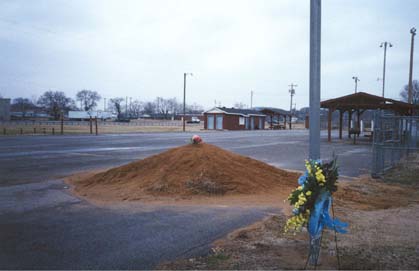Christ-Centered Encouragement for Wounded Hearts

Hartsville Park After the Accident, February 8, 2001
The Believer's Dictionary:
The Joy of Thinking Biblically About the Words We Use
October, 2006

As I have traveled through the Valley of Bereavement, I have learned that believers have a different kind of dictionary. It is a heavier book than the average dictionary because it has more pages. It has more pages because common words are defined not only from the perspective of normal usage but also from Biblical usage. One example is the word perish. We sometimes speak of those who died tragically as those who perished. In general, we might say that she perished at the World Trade Center; he perished at Pearl Harbor; or they perished when the Titanic sank.
However, in biblical language, one can die without perishing. Consider Luke 21:16-18, "But you will be delivered up even by parents and brothers and relatives and friends, and they will put some of you to death, and you will be hated by all on account of My name. Yet not a hair of your head will perish" (NASB).
This verse speaks of people dying without perishing. As far as I know, every faithful disciple except one died a martyr's death. Yet, none of them perished except for the unfaithful disciple who betrayed Christ.
Not only did these people die without perishing, but they also gained their lives. Consider the following verse, Luke 21:19, "By your endurance you will gain your lives" (NASB).
The context is people who could have saved their earthly lives by denying Christ. Instead, they stood firm in their faith, confident that the life to come was much more important than their brief life in this world.
The key to surviving the journey through the Valley of Bereavement is to have your joy firmly grounded in the things that are most important. Some words are more important than others, and even for important words, some definitions are more important than others. The perishing that puts us in the grave is important, but it is not nearly as important as that eternal perishing that signifies Hell. The life we have on this earth is also important, but it is not nearly as important as the life to come. The assurance that we will have homes to live in, food to eat, and health to sustain us is important, but it is not nearly as important as the assurance that we are ready to face God at any time.
I thank God that before my son died at the age of thirteen, he was ready to face God. Yes, he had his faults, and he had his spiritual struggles, but his soul was safe. His soul was safe, because Steve was not trusting in his own righteousness to get him to heaven. No, he was trusting solely in the grace of God. That grace not only taught his heart to fear the wrath of God, but it also relieved those same fears by bringing him to faith in Jesus Christ.
When Steve was around eleven, some of his friends used to joke about the thickness of his hair, saying that if he ever fell on his head, he would not get hurt: he would just bounce. Eventually, while doing a bicycle trick that went wrong, he did fall on his head, but he did not bounce -- he died. Yet, not a hair on his head perished.
"For God so loved the world, that He gave His only begotten Son, that whoever believes in Him should not perish, but have eternal life" (John 3:16, NASB).
- Guestbook and Comments
Comments and suggestions are welcome.
- All Issues of The Monthly Encourager.
Home Help for Those Who Grieve Reflections